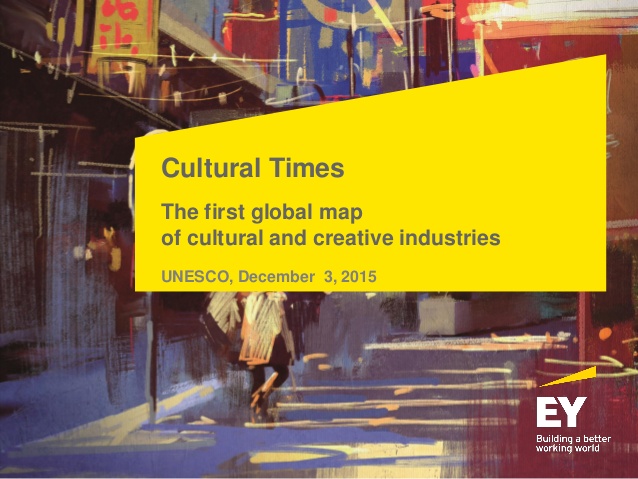Basic Economics of Copyright Infringement and Piracy in Developing Countries
- CIPIT |
- December 15, 2015 |
- Guest Post
By *Samuel Ugwumba

The emerging concept of creative economy with its underlying ideas has arguably embraced its apogee in the publication of a new study commissioned by CISAC titled “Cultural Times—The First Global Map of Cultural and Creative Industries.” The conclusions of the study are not new (See UNESCO and UNCTAD creative economy reports). What is new, according to CISAC, is that the study is the first to quantify the global economic and social contribution of cultural and creative industries.
As is usually the case with studies on creative economy, the emphases are on the economic and non-economic potentials/contributions of the cultural and creative industries; and the challenges posed by piracy to these industries and the economy (I agree with all these). My worry, however, is that concerns about piracy in these studies are usually followed by recommendations to increase protection and strengthen enforcement of copyright law.
Little or no attempt is made to analyse or understand the root causes of piracy in developing countries. Consequently, developed and developing countries are jumbled together in the procrustean panacea for piracy— effective copyright enforcement. My own view is that in most cases increased protection and enforcement of copyright will not deter piracy of cultural works. In the following paragraphs, I use Nigeria as a case study to show that the reason for this homogenous recommendation is a failure to take into account in most economic analyses the opportunity cost of buying original cultural works for the average consumer in developing countries.
To be clear, this post is not a defence of piracy. Creators should be rewarded for their original contributions irrespective of whether they would have made such contributions without financial incentives. In fact, the link between reward and creativity highlights the interconnectedness of freedoms. The economic freedom facilitated by monetary compensation enhances the creative freedom of creators and this in turn provides a podium for free speech and human development.
This interconnectedness of freedoms operates not just within but also across persons. For example, the diminution in the economic freedom of persons (say consumers of musical works) due to economic circumstances might impinge on the economic and creative freedoms of creators. I suggest that this is the root cause of piracy, at least for a developing country like Nigeria.
Now to the economic analysis: how will a consumer, say Ugwumba (U), decide whether to buy the legitimate cultural work (L) or the illegitimate (I)? According to neo-classical economics, U will choose the utility maximizing or cost minimizing option. This means U will choose the infringing work if its value minus costs exceed the value of the legitimate work minus costs. Value is simply the maximum a consumer is willing to pay for a good. So VL represents the value of the legitimate cultural work to the consumer; VI the value of the infringing cultural work; CL and CI the costs of accessing the legitimate and illegitimate cultural works respectively.
So U decides to infringe if VI > CI and VI – CI > VL – CL. So what then are the costs? Let’s use Nigerian album to calculate CL. Ice Prince’s album, Everybody Loves Ice Prince, sells for €8.99 (Approx. ₦2000) on itunes and €9.49 on Google Play while Brymo’s Tabula Rasa sells for ₦1200 (Approx. €6) on Konga, a Nigerian online platform. We must also add to CL the transaction costs of accessing some titles online because not all are legitimately available online. And even where they are, the payment method (Visa, Master Card etc.) may not be available to some consumers. For CI, it can be represented as A+S*P: where A is the cost of accessing the infringing work, which is negligible since most people would already have access to the internet; S the cost of sanctions imposed on the infringer should he/she be found liable; and P the probability of sanctioning the infringer. Suppose for every 2000 online infringements one individual is held liable and a fine of 500euros imposed, then CI will be 500 x 0.05% (i.e. S*P), which is equal to 25cents. Note that this figure grossly exaggerates the ratio of persons held liable for online infringements because to my knowledge no one has been held liable in Nigeria. Because CI < CL (25cents is < 9euros), U will decide to consume I.
Accordingly, the recommendation of the policy analyst will be to increase S and P by strengthening the protection and enforcement of copyright law. But this will likely be fruitless due to CL. CL represents not just the market price (MP) of L plus transaction costs (TC) but also the opportunity cost of buying L (OC). O is simply the value of an alternative that must be forgone in order to buy L. For some developing countries like Nigeria, the forgone alternative is the food the €9 would have purchased. So CL properly calculated is MP+TC+OC.
Several conclusions follow from this analysis. First, even if the ratcheting up of copyright law leads to a substantial decrease of online piracy, majority of consumers will not buy cultural works because of the opportunity cost. This means that current levels of piracy in Nigeria do not really pose substantial economic harm to creators because in the absence of piracy most consumers will not buy the cultural work. Secondly, and most relevant, is that the issue of piracy should go beyond copyright enforcement. This aligns with and extends the theme of my previous post in which I argued that creativity and innovation are about governance. Government should start addressing issues of unemployment and income inequality. Lastly, creative industries should enhance distribution channels so as to reduce the transaction costs of accessing cultural works online.
*Samuel Ugwumba is a Ph.D candidate and University College Cork Law and Business scholar researching on copyright and music. Follow him on Twitter @samwilbanks
